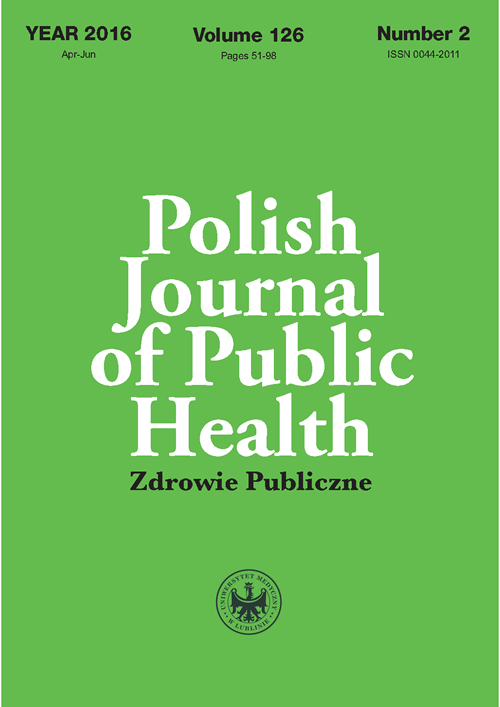Knowledge of women living in Otwock county about breast cancer
DOI:
https://doi.org/10.1515/pjph-2016-0012Keywords:
breast cancer, risk factors, knowledge, Breast cancer prevention, the role of a pharmacist in sharing knowledgeAbstract
Breast cancer is one of the most common types of cancer in women. In 2012 alone, some 17000 women developed breast cancer and the condition accounted for 5574 deaths. Breast tumor poses a huge threat for women aged 46-65 (working age) and other age groups are at an only slightly lower risk. An early diagnosis of breast cancer would increase chances of survival, which means that it is essential to educate women about breast tumors, risk factors, symptoms and diagnosis.
The authors of this work aimed at assessing the knowledge of women residents of Otwock County about breast tumors.
The study included a questionnaire including 31 questions, containing queries looking at women’s knowledge of breast tumors and it was distributed to residents of Otwock County between September and October 2014.
An analysis of the questionnaire responses suggests what follows: (i) women of all ages are not knowledgeable enough about cancer; (ii) medical professionals, like general practitioners, gynecologists, pharmacists and even nurses should encourage women to learn more about tumors, (iii) women still do not know how to perform breast self-exams, (iv) women are aware of the fact that routine checkups are essential but they do not have them and also mistake the names of preventive programs for names of institutions and organizations that deal with fighting cancer, (v) women still do not know that mammogram tests are free of charge and in order to have them done, they do not need to have a referral.
References
1. Sytuacja zdrowotna ludności. Polski Państwowy Zakład Higieny. Warszawa; 2012.
2. Krajowy Rejestr Nowotworów
3. Mazowiecki Rejestr Nowotworów
4. Didkowska J, Wojciechowska U, Zatoński W. Nowotwory złośliwe w Polsce w 2009 roku. Warszawa: Ministerstwo Zdrowia; 2011.
5. Wołowski T, Wróblewska P. Ocena wiedzy gdańskich studentek na temat profilaktyki raka piersi. Probl Hig Epidemiol. 2012;93:347-9.
6. Pażdzior A, Stachowska M, Zielińska M. Wiedza kobiet na temat profilaktyki raka piersi. Now Lek. 2011;80(6):419-22.
7. Nita R, Łeśniczak B, Słomka B, et al. Wiedza i zachowania zdrowotne kobiet z województwa łódzkiego w zakresie profilaktyki raka piersi. Pielęg XXI w. 2010;30/31(1-2):5-8.
8. Adamowicz K, Zaucha JM, Majkowicz M. Ocena wiedzy pacjentek Poradni Profilaktyki Chorób Piersi w zakresie profilaktyki chorób nowotworowych. J Oncol. 2011;61(5):449-57.
9. Zych B, Marć M, Binkowska-Bury M. Stan wiedzy kobiet po 35 roku życia w zakresie profilaktyki raka piersi. Prz Med Uniw Rzesz. 2006;1:27-33.
10. Lewandowska A, Mess E, Laufer J. Profilaktyka raka piersi wśród kobiet. Onkol Pol. 2011;1:131-4.
11. Smoleń E, Dobrowolska B. Wiedza pielęgniarek województwa lubelskiego i podkarpackiego w zakresie czynników ryzyka nowotworów piersi. Med Og Nauk Zdr. 2014;20(1):6-11.
12. Cichońska M, Borek M, Krawczyk W. Wiedza kobiet w zakresie zapobiegania nowotworom piersi i raka szyjki macicy. Acta Sci Acad Ostrov. 2012;1:5-25.
Downloads
Published
Issue
Section
License
Copyright (c) 2016 Polish Journal of Public Health

This work is licensed under a Creative Commons Attribution-NonCommercial-NoDerivatives 3.0 Unported License.


